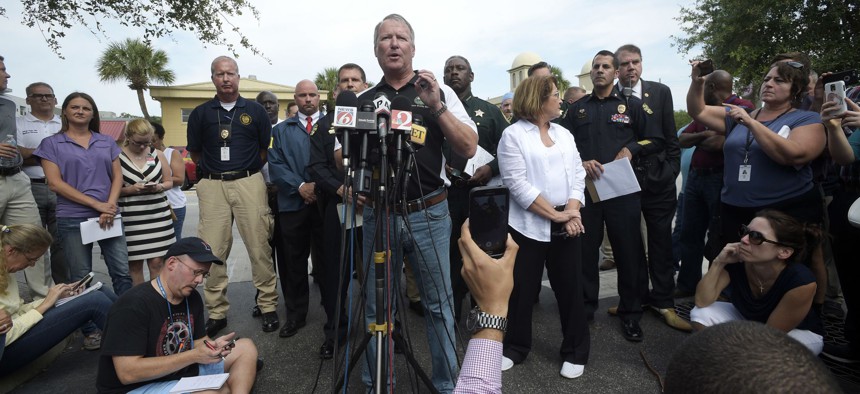The ‘Most Difficult Day in the History of Orlando’ Prompted a Massive Intergovernmental Show of Force

Orlando Mayor Buddy Dyer addresses reporters while flanked by members of law enforcement and community leaders during a news conference after a shooting involving multiple fatalities at a nightclub in Orlando, Fla., on Sunday. Phelan M. Ebenhack / AP Photo
Connecting state and local government leaders
America’s deadliest mass shooting required a swift response from state and local agencies and other stakeholders to deal with the immediate danger and to manage the continuing crisis.
The shooting attack at a gay nightclub in Orlando, Florida over the weekend, which left 49 people dead and dozens wounded, serves as bleak reminder of how quickly state and local governments can find themselves thrust into a complex emergency response effort.
Previous rampage shootings offer law enforcement agencies, emergency responders and government officials a window into these types of incidents. But each situation is different. And the state of Florida, the city of Orlando and Orange County were confronted with what would become the deadliest mass shooting in modern U.S. history—now being investigated as an act of terrorism.
“This is probably the most difficult day in the history of Orlando,” the city's mayor, Buddy Dyer, said Sunday.
It was around 2 a.m. on Sunday when the first shots were fired at Pulse nightclub, according to information the city released. The club is located on South Orange Ave., about 7 miles northwest of Orlando International Airport.
The gunman was later identified as 29-year-old Omar Mateen of Fort Pierce, Florida.
An American citizen, Mateen legally purchased firearms within the last week, an official with the Bureau of Alcohol, Tobacco, Firearms and Explosives Tampa field office said, according to the city. The bureau described the firearms used in the attack as an AR-15 type rifle and a 9mm semiautomatic pistol.
During the incident, Mateen is said to have called 911 and professed his allegiance to the Islamic State, a terrorist group also known as ISIL or ISIS. He had previously been interviewed by the F.B.I. for suspected ties to Islamic militants.
“The one thing that we can say is that this is being treated as a terrorist investigation,” President Obama said during remarks on Monday.
“It does appear that, at the last minute, he announced allegiance to ISIL, but there is no evidence so far that he was in fact directed by ISIL,” the president added, referring to Mateen. “And there also at this stage is no direct evidence that he was part of a larger plot.”
Orlando’s police department, the Orange County Sheriff’s Office, and Florida’s Division of Emergency Management, Department of Law Enforcement and Department of Health are among the multiple agencies that have taken part in the response to the attack.
The Federal Bureau of Investigation is the lead federal law enforcement agency for the incident.
Florida’s State Emergency Operations Center in Tallahassee was activated mid-day Sunday to assist with coordination across levels of government.
An off-duty Orlando police officer, in full uniform, was providing security at Pulse when the shooting began, and engaged in a gun battle with Mateen near one of the entrances, Orlando Police Chief John Mina said at a Monday morning news conference.
When additional officers arrived on the scene they too exchanged fire with the gunman, who then retreated into a bathroom, where police believed he had several hostages, Mina said.
“Things kind of stabilized” at this point, the chief explained. But during subsequent phone conversations with authorities, Mateen made statements about having explosives, which turned out to be false.

A SWAT team was called and police made preparations to blast a hole in the bathroom wall from outside of the club.
“We believed further loss of life was imminent,” Mina said, as he explained the decision he made around 5 a.m. to move forward with a rescue operation to free those remaining inside.
When an explosive charge failed to breach the bathroom wall, police rammed it with a Bearcat armored vehicle, punching a 2- to 3-foot wide hole in the building.
Mina said “dozens and dozens” of people that came out of the hole in the wall were able to be rescued.
The suspect came out of the hole as well. He exchanged fire with officers, and was killed.
“The OPD officers,” Mina said, “acted very heroically and courageous and saved many, many, many, many lives during this operation.” One officer was struck in his kevlar protective helmet, the chief added, noting that the helmet saved the officer’s life.
The grim work of identifying the dead followed the shooting.
Orlando Mayor Buddy Dyer on Monday commended the local medical examiner’s office and the Florida Department of Law Enforcement for working through the night to identify, 48 of the 49 victims in the attack, and to notify their next of kin.
The Florida Department of Health activated the state’s Emergency Mortuary Operations Response System, according to Gov. Rick Scott’s office, and a 22-person Victim Identification Unit was deployed to support the medical examiner’s office that serves Orange County, where Orlando is located.
Scott, meanwhile, requested a federal emergency declaration on Monday from President Obama.
“Yesterday’s terror attack was an attack on our state and entire nation,” Scott said in a statement. “I have asked President Obama to declare an emergency so that the full resources of the federal government can be made available for all those impacted by this horrific massacre.”
As the victims of the shooting were identified, the city of Orlando posted their names and ages on a city webpage. Their ages ranged from 18 to 50 years-old.
In addition to those killed, 53 people were injured in the attack.
Dr. Mike Cheatham, a trauma surgeon at Orlando Regional Medical Center, where 46 of the wounded were taken, told the Associated Press Sunday: "I think we will see the death toll rise."
Blood banks in the Orlando area reported that donation centers were overcrowded. The state Department of Health asked willing donors to schedule appointments to donate blood later in the week.
According to Scott’s office, Seminole State College and Valencia College, which have campuses in the Orlando area, had grief counselors available for students and staff.
Florida’s Fish and Wildlife Conservation Commission had what’s known as its Critical Incident Stress Management Team available in the Orlando region to provide emotional and psychological support to first responders if needed.
Amid the response, the city has had to contend with an influx of news media and issued a call on Monday for news outlets to keep streets and sidewalks in certain areas clear. Along with traditional news releases and press conferences, the city and the local police department have turned to Facebook and Twitter to disseminate information.
Orlando officials have made pleas for people to hold-off with vigils, and other mass-gatherings in the wake of the shooting, cautioning Sunday that the events can strain limited public safety resources.
Equality Florida, an organization focused on LGBT rights issues, said Monday the city had granted the group permission to hold an evening vigil outside the Dr. Phillips Center for the Performing Arts. Dyer’s office said the mayor would attend the event, and that the city is working on plans for a memorial service to honor the victims of the attack.
In a statement on Monday, Dyer said: “I stand here today even more proud of our community because they came together, united to support the families and friends of the victims.”
Bill Lucia is a Reporter for Government Executive’s Route Fifty.

NEXT STORY: Cities Get a Resource Toolkit for Data-Driven Government



